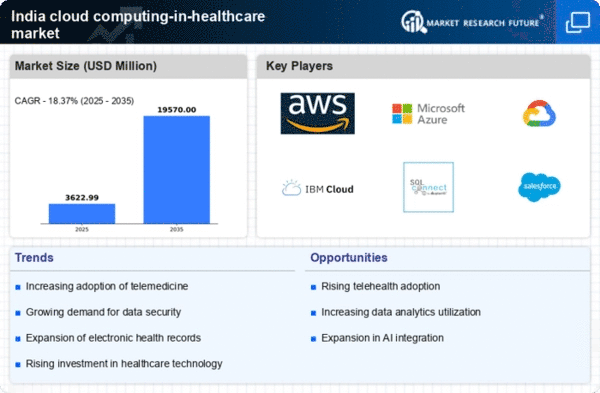Interoperability and Data Sharing
Interoperability is a critical factor driving the cloud computing-in-healthcare market in India. The ability to share data seamlessly across different healthcare systems is essential for improving patient outcomes and enhancing care coordination. Cloud-based solutions facilitate interoperability by providing a unified platform for data exchange among various stakeholders, including hospitals, laboratories, and insurance providers. This interconnectedness is vital in a country where diverse healthcare systems coexist. As healthcare providers increasingly seek to improve collaboration and data sharing, the demand for cloud solutions that support interoperability is expected to rise. This trend is likely to enhance the overall efficiency of healthcare delivery in India.
Government Initiatives and Support
Government initiatives play a crucial role in propelling the cloud computing-in-healthcare market in India. The Indian government has launched various programs aimed at digitizing healthcare services, such as the National Digital Health Mission (NDHM). This initiative aims to create a comprehensive digital health ecosystem, promoting the adoption of cloud technologies among healthcare providers. Furthermore, the government is investing in infrastructure development to enhance internet connectivity, particularly in rural areas, which is essential for cloud-based healthcare solutions. With an estimated investment of over $1 billion in digital health initiatives, the government is fostering an environment conducive to the growth of cloud computing in healthcare, thereby driving market expansion.
Growing Focus on Patient-Centric Care
The shift towards patient-centric care is significantly influencing the cloud computing-in-healthcare market. Healthcare providers in India are increasingly prioritizing patient engagement and satisfaction, which necessitates the use of advanced technologies. Cloud computing enables the development of personalized healthcare solutions, allowing providers to tailor services to individual patient needs. With the rise of mobile health applications and patient portals, patients can access their health information and communicate with providers more effectively. This trend aligns with the broader movement towards value-based care, where patient outcomes are emphasized. As healthcare organizations strive to enhance patient experiences, the adoption of cloud technologies is likely to accelerate, further driving the market.
Cost Efficiency and Resource Optimization
Cost efficiency is emerging as a significant driver in the cloud computing-in-healthcare market. Healthcare organizations in India are increasingly recognizing the financial benefits of adopting cloud solutions. By leveraging cloud infrastructure, hospitals and clinics can reduce their IT expenditures, as they no longer need to invest heavily in on-premises hardware and maintenance. Studies indicate that cloud adoption can lead to cost savings of up to 30% for healthcare providers. Additionally, cloud computing enables better resource allocation, allowing healthcare facilities to focus on patient care rather than IT management. This shift towards cost-effective solutions is likely to accelerate the adoption of cloud technologies in the healthcare sector.
Rising Demand for Remote Patient Monitoring
The cloud computing-in-healthcare market is experiencing a notable surge in demand for remote patient monitoring solutions. This trend is driven by the increasing prevalence of chronic diseases in India, which necessitates continuous health monitoring. According to recent estimates, approximately 70% of deaths in India are attributed to chronic conditions, highlighting the need for effective management strategies. Cloud-based platforms facilitate real-time data collection and analysis, enabling healthcare providers to monitor patients' health remotely. This not only enhances patient engagement but also reduces hospital visits, thereby optimizing healthcare resources. The integration of cloud computing in remote monitoring systems allows for scalable solutions that can accommodate a growing patient population, making it a pivotal driver in the cloud computing-in-healthcare market.
















